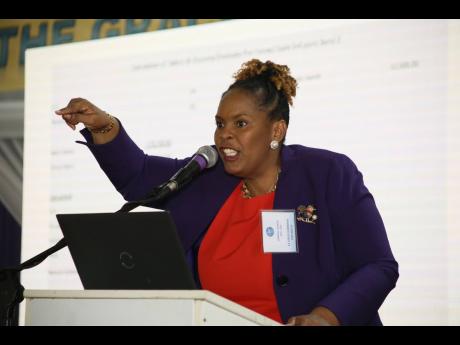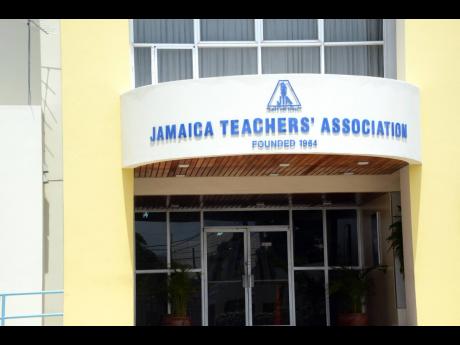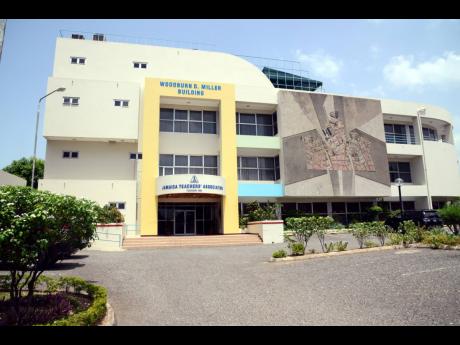JTA sued for accepting Gov’t wage offer
Past president drags teachers’ union to court
The union representing teachers in Jamaica is now entangled in a lawsuit —filed by a former president — which aims to nullify its current three-year wage agreement with the Government, according to court documents.
La Sonja Harrison, immediate past president of the Jamaica Teachers' Association (JTA), contends in the lawsuit that the virtual special delegates' vote – held in March last year – to accept the wage offer presented by the Ministry of Finance and the Public Service was in breach of the JTA's constitution.
“Section 14 of the [JTA] constitution explicitly states that voting must be carried out by the assembly of delegates at a physical location and not virtually,” she asserted in an affidavit obtained by The Sunday Gleaner.
According to the lawsuit, section 14 is similar to section 13, which deals with the holding of the union's annual conference.
“In both instances, the delegates can only vote with their physical presence by a show of hand or where secret ballots are permitted.”
“The claimant, therefore, contends that the acceptance of the present salary package given to members of the JTA is void on the basis that the JTA was not properly constituted in carrying out the vote to accept the government's offer,” Harrison argued.
The virtual conference where delegates voted to accept the government's wage offer was chaired by Harrison in her capacity as JTA president at the time, according to members of the executive.
She acknowledged, in the lawsuit, that it was her proposal for the conference to be convened online, but said this was based on advice from the secretariat. Harrison noted, too, that online meetings and conferences was “the practice throughout” because of the COVID-19 pandemic .
At the onset of the pandemic in March 2020, the government enacted rules under the Disaster Risk Management Act (DRMA) that, among other things, placed limits and included nightly curfews. These were withdrawn in March 2022, a year before the now-contentious virtual special delegates' vote was taken.
Seeks five declarations
The lawsuit, which was filed in the Supreme Court last Wednesday by the law firm Hugh Wildman & Company, seeks five declarations, including an order that the voting that took place during the special delegates' conference on March 12, 2023, was “unlawful” because it “was not in keeping with the constitution of the JTA”.
Further, Harrison wants the court to declare the result of the poll “null and void and of no legal effect”, claiming that the delegates “did not vote in keeping with section 14 of the constitution of the JTA”.
Approximately 80 per cent of the delegates who were present voted to accept the three-year agreement, which became effective April 1, 2022. It includes a guaranteed 20 per cent minimum increase in basic salary after tax deductions.
Harrison raised eyebrows at the time when she walked out of the contract-signing ceremony at the finance ministry's downtown Kingston office, leaving other members of the JTA executive to sign.
The lawsuit also seeks a declaration that the constitution of the JTA does not provide for a special meeting to be conducted by online voting and a declaration that, under the JTA constitution, a special conference must be convened with the physical presence of all delegates participating in the vote and not by virtual voting.
Incumbent JTA president Leighton Johnson confirmed that he is aware of the lawsuit, but declined to comment.
“There is a case pending, so I will not make any comment at this time,” he told The Sunday Gleaner when contacted on Friday.
Could present a dilemma
A legal victory for Harrison could present a dilemma for over 30,000 teachers – including the former JTA president – who have already received billions of dollars in salary and retroactive payments under the new wage pact, one veteran educator opined.
The three-year agreement is scheduled to end next March.
“Over 30,000 teachers have been impacted by this negotiation. If she gets all the declarations being sought, what would be the remedy”?
“How would this issue be resolved,” the educator questioned.
However, according to one senior attorney, the salaries and retroactive payments made to teachers under the three-year pact would not be impacted if the court sides with Harrison.
“It would certainly affect the decision and everything would be nullified, but I don't think the salary increase would be affected, because the government's processes for giving the salary increase was perfectly in accordance with the law and valid,” said the attorney, who did not want to be named.
“What would have been invalid is the approval and vote of the JTA.”
Harrison disclosed in her affidavit that, in the days after the special delegates' conference, she sought and obtained a legal opinion regarding the legality of the vote to accept the wage offer made by the finance ministry.
According to the former JTA president, the legal advice indicated that the vote “was not in keeping with the JTA's constitution”.
Harrison said she alerted JTA Secretary General Dr Mark Nicely of the “irregularity” and followed up with an email dated March 31 last year. She said Nicely responded via email the same day, but details of his response were not included in the affidavit.



